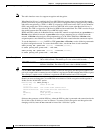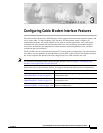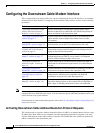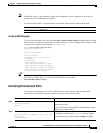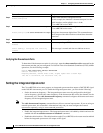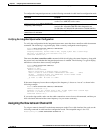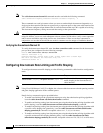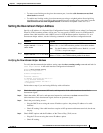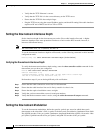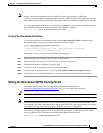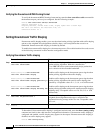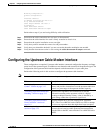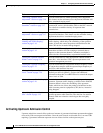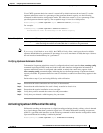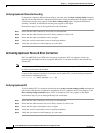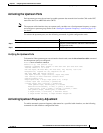
3-8
Cisco uBR7200 Series Universal Broadband Router Software Configuration Guide
OL-2239-03
Chapter3 Configuring Cable Modem Interface Features
Configuring the Downstream Cable Modem Interface
• Verify that the TFTP filename is correct.
• Verify that the TFTP file is in the correct directory on the TFTP server.
• Ensure that the TFTP file has read privileges.
• Ping the TFTP server using the source IP address option, and check IP routing if the cableinterfaces
acquire an RF and a DHCP, but fail on ToD or TFTP.
Setting the Downstream Interleave Depth
Set the interleave depth for the downstream port on the Cisco cable interface line card. A higher
interleave depth provides more protection from bursts of noise on the HFC network; however, it
increases downstream latency.
Note The valid values are 8, 16, 32 (default), 64, and 128.
To set the downstream interleave depth in milliseconds, use the following command in cable interface
configuration mode:
Router(config-if)# cable downstream interleave-depth {8|16|32 |64|128}
Verifying the Downstream Interleave Depth
To verify the downstream interleave depth setting, enter the show controllers cable command for the
downstream port you have just configured:
Router# show controllers cable5/0 downstream
Cable5/0 Downstream is up
Frequency=96000000, Channel Width 6 MHz, 64-QAM, Symbol Rate 5.056941 Msps
FEC ITU-T J.83 Annex B, R/S Interleave I=32, J=
Perform these steps if you are having difficulty with verification:
Step1 Ensure that the cable connections are not loose or disconnected.
Step2 Ensure that the cable interface line card is firmly seated in its chassis slot.
Step3 Ensure that the captive installation screws are tight.
Step4 Verify that you have entered the correct slot and port numbers.
Step5 Verify that the downstream carrier is active, using the cable downstream if-output command.
Setting the Downstream Modulation
To set the downstream modulation, define the speed in symbols per second at which data travels
downstream to the subscriber’s CM. Asymbol is the basic unit of modulation. Quadrature Phase Shift
Key (QPSK) encodes 2 bits per symbol, Quadrature Amplitude Modulation (QAM) -16 encodes 4 bits
per symbol, QAM-64 encodes 6 bits per symbol, and QAM-256 encodes 8 bits per symbol.



